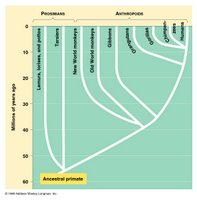Happy Belated Darwin Day
My graduate school project dealt with issues of menopause, hormone replacement, and cognition. Specifically I wanted to know how long-term loss of ovarian hormones, or long-term hormone replacement, impacted performance on tests of learning, memory, and attention. I also wanted to study the neurotransmitter systems affected by chronic hormone loss/replacement. Now obviously this sort of work is difficult to do in women, and for a variety of reasons I won't go into now. Suffice to say that an appropriate animal model needs to be employed if these sorts of experiments are to have appropriate controls.
So who do we turn to? Click below to see.
Our obvious first choice would be our closest cousins the Great Apes. However, apes are not feasible to work with in large numbers; they live almost as long as humans, are expensive to care for, and freakishly strong. Restrictions also prevent invasive research from being conducted on them. So where else can we look?
 We start by looking at phylogeny; which extant animals are phylogenically close to us? Barring the apes, the next closest group would be the Old World monkeys. Monkey lineages split from ours more recently than any other group of primate species, but there are two to choose from. It turns out the New World monkeys aren't such a good choice, as these monkeys evolved after South America split from Africa. New World monkeys remained arboreal while Old World monkeys spend at least some of their time on the ground. Recently, Old World monkeys shared the habitats and to some extent the diets of their ape cousins.
We start by looking at phylogeny; which extant animals are phylogenically close to us? Barring the apes, the next closest group would be the Old World monkeys. Monkey lineages split from ours more recently than any other group of primate species, but there are two to choose from. It turns out the New World monkeys aren't such a good choice, as these monkeys evolved after South America split from Africa. New World monkeys remained arboreal while Old World monkeys spend at least some of their time on the ground. Recently, Old World monkeys shared the habitats and to some extent the diets of their ape cousins. It turns out that certain macaque species share numerous features with humans. Macaques have 28 day menstrual cycles that are virtually identical to those of a human female. They also undergo an eerily similar menopause. Their cardiovascular and skeletal systems respond to hormone loss and replacement in ways similar to humans. So from an endocrine standpoint, macaques are a good choice for the sort of research I want to do.
What about the brain? After all, I'm a neuroscientist, so I kinda care about that aspect. It so happens that macaques share a number of similarities in this department as well. They can be taught to perform tests of memory and attention that are directly adapted from tests used in clinical settings. Furthermore, their brains are arranged quite similarly to ours; each cytoarchitectonic subdivision identified in the macaque has a homologous area in the human. These areas have connection patterns that resemble those of humans, and the major neurotransmitters distribute themselves throughout the brains of monkeys in patterns similar to humans.
Ok, I've spent enough time on this for one day. In closing I would like to say thank you, Chuck, for the theory. Common descent helps me to understand why my chosen model works, and is much more satisfying than the untestable, unfalsifiable "they had a common designer, so they look similiar".


3 Comments:
I just posted a wee post on my blog last week
INS: Menopausal Memory Complaints Linked to Mood - CME Teaching Brief - MedPage Today
In it there seemed to be little other than oh- your older, you have too much to do, and menopause happens when you are older and have lots to do. I do not like this, so I am interested in if ANYTHING that disproves the psychosomatic stuff is happening in real time. I would love to know more, as I do think that there are a million things we do not know about female hormones and their effects on the brain, immune system and a multitude of other systems. Is estogen safe- another question....
By Impatient Patient, at 2/16/2006 01:53:00 AM
Impatient Patient, at 2/16/2006 01:53:00 AM
Nice post. And cool research. A bit close to home, actually. I lost my mom a couple of years back to Pancreatic cancer. She was on a whalloping dose of hormone replacement for a few years before that.
When she asked her PC Phys about a variety of symptoms, the doc consistently chalked them up to menopause or the hormones and sent her on her way. Meanwhile she was eating herself alive from the inside. And the doc was a woman, too. I hope Kaiser burns in hell.
This is, of course, anecdotal, but I wonder constantly about the vicious connections between
1. Women getting short shrift in the med system
2. Many possible warning signs of serious conditions, including mental illness being chalked up to menopause and not being diagnosed
3. A society that deems women worthless when they are no longer able to carry babies
4. Overmedication of a natural process
Keep up the good wor, and good blog, mate.
DD
By Dan Dright, at 2/18/2006 06:28:00 PM
Dan Dright, at 2/18/2006 06:28:00 PM
By the way, I'm sure you've come across the work done on expansion/contraction of the somatotopic map when estradiol levels change. But if not, it is fascinating stuff.
By Dan Dright, at 2/18/2006 06:31:00 PM
Dan Dright, at 2/18/2006 06:31:00 PM
Post a Comment
<< Home